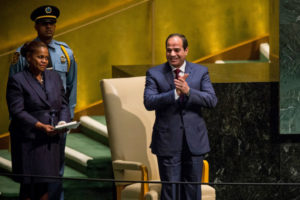Misstated Excerpt of Times Article Offers Fresh Take on President Sisi of Egypt

President Abdel Fattah el-Sisi of Egypt preparing to deliver a speech to the United Nations General Assembly last month. Credit Andrew Burton/Getty Images
There is no such thing as bad press for President Abdel Fattah el-Sisi, at least not if it is translated by Al Ahram, Egypt’s flagship state newspaper.
A recent report in The New York Times described the muted reaction to Mr. Sisi’s speech last month before the United Nations General Assembly compared with its portrayal at home, where “the Egyptian news media is hailing his performance there as a transformational moment.”
A day after the article appeared in The Times, Al Ahram’s summary of it misstated parts of the article an apparent effort to burnish Mr. Sisi’s image in Egypt.
Below is an excerpt from The Times article published online on Oct. 7and the Ahram account, translated back to English. (Arabic readers can find the original Ahram article here.)
TIMES ACCOUNT, Oct. 7, 2014
With President Abdel Fattah el-Sisi back from his first visit to the United Nations, the Egyptian news media is hailing his performance there as a transformational moment, for the Egyptian president and even for the General Assembly.
No longer tainted as a former general who ousted Egypt’s first democratically elected president, Mr. Sisi was finally recognized by the international community as a respected statesman and regional leader, Egyptian commentators say. Mr. Sisi even “changed the way presidents make speeches at the United Nations,” the talk show host Amr Adeeb proclaimed, showing a video clip of Mr. Sisi ending his speech late last month by chanting his nationalist campaign slogan.
“Long Live Egypt!” Mr. Sisi said to what Egyptian viewers saw as raucous applause from the assembled world leaders.
“A thing of genius,” Mr. Adeeb declared, suggesting the assembly had consecrated a marriage. “Abdel Fattah el-Sisi was the groom of the United Nations, and Egypt was the bride.”
More than any change in his standing abroad, however, what the event demonstrated was the strength of the cult of personality that Mr. Sisi’s allies are building around him at home as he consolidates his power — a persona far more exalted and protected than even that of Hosni Mubarak, his long-serving predecessor. What viewers back in Egypt could not see was that during the General Assembly, almost all of the diplomats present watched in amused silence as Mr. Sisi’s small entourage did the clapping in response to his chant. But the Egyptian media’s applause was sustained and unanimous, dramatizing a monopolization of power under Mr. Sisi that many analysts say has not occurred in this country since the rule of Mohamed Ali Pasha, the early 19th-century founder of the modern Egyptian state.
AL AHRAM VERSION (in Arabic)
Writer David Kirkpatrick has said that during his speech at the United Nations General Assembly President Abdel Fattah al-Sisi affirmed his image in international public opinion as a well-respected and admired statesman in the region.
Kirkpatrick explained in an article published yesterday by the American newspaper “The New York Times” that al-Sisi was able to “change the way that presidents present their speeches at the United Nations,” by ending his speech shouting, “Long Live Egypt!”
The writer described the unique scene at the headquarters of the United Nations, when al-Sisi received warm applause from the assembled world leaders after he shouted “Long Live Egypt.”
In Kirkpatrick’s view, al-Sisi was able to erase the image that was in the minds of some people, that what happened in Egypt in June, 2013, was a “coup,” not a revolution.
He stated that the al-Sisi’s rule has come to rely on the strength of his personality and his tremendous popularity in an unprecedented way, through the support he receives in the Egyptian state and through his allies, which have enhanced his authority and crowned all he has done since the outbreak of the June 30 revolution.
Kirkpatrick pointed out that all the diplomats were in a state of silence and enjoyment throughout al-Sisi’s speech.
He also mentioned a statement by Khaled Fahmy, a professor of history at the American University in Cairo, who said that what is happening now is unprecedented in modern Egyptian history, and that all of this is just the beginning of a new phenomenon in the rule of Egypt.